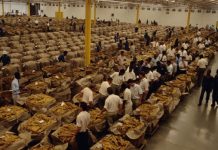ISLAMABAD, May 29 (DNA): The Islamabad-based think tank, Capital Calling has hailed the reports suggesting that the International Monitory Fund (IMF) has remained steadfast in its recommendation for uniformed tax on tobacco products in the upcoming budget regardless of their national or foreign branding.
The think tank said that the reports about recommendation for over 20 percent tax raise on tobacco products were encouraging.
Dr Hassan Shehzad, from International Islamic University Islamabad (IIUI) said that estimates show that tobacco industry can do good with 40 percent tax raise in the coming budget.
Dr Shehzad, the only social researcher whose report was referred to by the IMF in its recommendations for tax reforms was of the view that copious research reports have found that if cigarette price increases its demand decreases. He said that during a survey of the major cities of the country, it was found that one in 94 smokers had quitted smoking after its price increase.
Rise in illicit trade was another cause of concern, he said and expressed shock on the findings of the World Health Organization (WHO) stating that “illicit trade market in Pakistan (of tobacco products) ranges from 9 to17 percent of the total cigarette market.”
The study was titled “Study on Incidence of Illicit trade of cigarettes in Pakistan: A case study for Islamabad Capital Territory”. The disturbing findings if the study is that “Overall, the illicit trade of cigarettes in Pakistan accounted for 23.1% of the total trade. Locally produced cigarettes without a stamp of the tax authority are considered illicit products and account for 10.4% of the total number of packs.”
Prof Muhammad Zaman, head of Zaman Research Center at Quaid-i-Azam University has said in a discussion of researchers that in a recent meeting of WHO titled “Global meeting to combat illicit tobacco trade concludes with decisive action”, it was presented that “Illicit trade accounts for about 11% of total global tobacco trade, and its elimination could increase global tax revenues by an estimated US$ 47.4 billion annually.”
Hence, he said, the volume of illicit trade in Pakistan was double than global average. He also said that the government should take corrective measures to stop this practice. He said the multinational cigarette companies that operate in Pakistan have been found involved in many illegal activities in different parts of the world. One of the companies was recently fined heavily for such practices in its home country, he said.
Prof Zaman said both the illicit trade and lower taxes on tobacco products are playing havoc with public health. The government should work on both these points at the earliest, he said.












